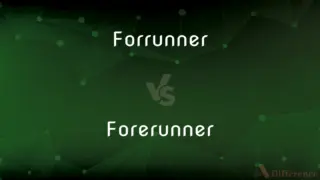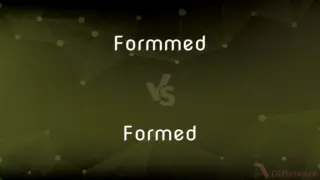Chronicle vs. Chronical — Which is Correct Spelling?
By Tayyaba Rehman — Updated on March 21, 2024
"Chronicle," meaning a record of events in chronological order, is correct, while "chronical" is an incorrect spelling. Ensure clarity and correctness in your writing.

Table of Contents
Which is correct: Chronicle or Chronical
How to spell Chronicle?

Chronicle
Correct Spelling

Chronical
Incorrect Spelling
ADVERTISEMENT
Key Differences
Link “chronicle” to “cycle” since it deals with the passage of time.
Associate "chronicle" with "chronological" since both share the root "chron."
Remember the “le” in “chronicle” like the “le” in “article.”
Picture “chronicle” to have a "le" at the end, like “candle” and “bottle.”
Remember "Chronicle" like the popular book series "The Chronicles of Narnia."
ADVERTISEMENT
How Do You Spell Chronical Correctly?
Incorrect: He wrote a detailed chronical of his travels around the world.
Correct: He wrote a detailed chronicle of his travels around the world.
Incorrect: The newspaper published a chronical of the city's development over the years.
Correct: The newspaper published a chronicle of the city's development over the years.
Incorrect: This chronical of events during the war is incredibly insightful.
Correct: This chronicle of events during the war is incredibly insightful.
Incorrect: She enjoys reading the chronical section in the library.
Correct: She enjoys reading the chronicle section in the library.
Incorrect: The ancient chronical contains records of the kingdom's history.
Correct: The ancient chronicle contains records of the kingdom's history.
Chronicle Definitions
A chronicle is a detailed record of events ordered by time.
The book is a chronicle of the war years.
To chronicle means to record events in a factual and detailed way.
The documentary chronicles the life of the activist.
A chronicle sometimes implies a factual written account of important or historical events.
The chronicle details the king’s reign.
Chronicle refers to narrating events in the order they occurred.
The film chronicles the events leading up to the revolution.
A chronicle can represent a regular publication detailing events.
The town’s monthly chronicle reported the local news.
A chronicle (Latin: chronica, from Greek χρονικά chroniká, from χρόνος, chrónos – "time") is a historical account of events arranged in chronological order, as in a time line. Typically, equal weight is given for historically important events and local events, the purpose being the recording of events that occurred, seen from the perspective of the chronicler.
An extended account in prose or verse of historical events, sometimes including legendary material, presented in chronological order and without authorial interpretation or comment.
A detailed narrative record or report.
Chronicles (used with a sing. verb) See Table at Bible.
To record in or in the form of a historical record.
A written account of events and when they happened, ordered by time.
To record in or as in a chronicle.
An historical register or account of facts or events disposed in the order of time.
A narrative of events; a history; a record.
The two canonical books of the Old Testament in which immediately follow 2 Kings.
To record in a history or chronicle; to record; to register.
A record or narrative description of past events;
A history of France
He gave an inaccurate account of the plot to kill the president
The story of exposure to lead
Record in chronological order; make a historical record
Chronicle Meaning in a Sentence
The chronicle of her adventures inspired many to travel.
The film serves as a visual chronicle of the artist's life.
This book is a chronicle of the major events of the 20th century.
The local museum displays a chronicle of the town's founding.
She contributed articles to a chronicle on local folklore.
The family's history was detailed in an old chronicle found in the attic.
The chronicle includes interviews with several historical figures.
A chronicle of the expedition revealed the challenges they faced.
Historians rely on chronicles to understand past societies.
Each chapter of the chronicle covers a different decade.
The chronicle featured rare photographs from the era.
He kept a daily chronicle of his life in the diary.
The chronicle was translated from an ancient manuscript.
The sports chronicle highlights significant moments in athletics.
The chronicle traced the lineage of several royal families.
The chronicle detailed the rise and fall of the empire.
A chronicle of the band's tour captured the excitement of live performances.
The chronicle collected stories of survival during natural disasters.
A culinary chronicle explored the history of world cuisines.
An online chronicle documented the development of the internet.
Students read the chronicle to learn about the civil rights movement.
The annual chronicle summarized the year's global events.
A digital chronicle archived the tweets of prominent figures.
An environmental chronicle discussed the impact of climate change.
The chronicle was awarded for its thorough research and compelling narrative.
Chronicle Idioms & Phrases
A chapter in the chronicle
A significant event in a series or sequence of events.
The moon landing is considered a major chapter in the chronicle of human exploration.
The living chronicle
Someone or something that embodies or represents a series of events or a period in history.
He was considered a living chronicle of jazz music, having performed for over six decades.
Chronicles of fame
Records or accounts of famous people or events.
The museum's new exhibit showcases the chronicles of fame from the golden age of Hollywood.
Chronicle of change
A record that details the evolution or transformation of something.
The book is a chronicle of change, showing how the city has evolved over centuries.
Chronicle the ages
To record events over a long period of time.
The monument was built to chronicle the ages of the civilization.
Chronicle of the heart
Personal experiences and emotions recorded or remembered.
Her poems are a chronicle of the heart, capturing her deepest feelings.
Chronicle of misfortune
A record of unfortunate or disastrous events.
The family's history read like a chronicle of misfortune, filled with tales of loss and hardship.
To turn the pages of the chronicle
To explore or review historical events or periods.
The documentary turned the pages of the chronicle on civil rights movements.
Chronicle of success
A record or account of successive achievements.
His career was a chronicle of success, with each project outdoing the last.
Unwritten chronicle
Significant events or stories not officially recorded or widely known.
The unwritten chronicle of the community includes tales of heroism and resilience.
Silent chronicle
The untold or unseen history of something.
The ruins are a silent chronicle of the city's past.
Epic chronicle
A grand and extensive narrative or account.
The epic chronicle of the kingdom spanned several volumes.
Personal chronicle
A diary or journal that records an individual's experiences.
Her personal chronicle offered insights into daily life during that era.
Chronicle of discovery
An account of finding or uncovering something significant.
The chronicle of discovery details how the ruins were found.
Chronicle of hope
A narrative or account that inspires optimism for the future.
Despite the challenges, the community's story remains a chronicle of hope.
Common Curiosities
What is the verb form of chronicle?
Chronicle.
What is the root word of chronicle?
The root word is “chron,” related to time.
Why is it called chronicle?
It's derived from the Old French "cronicle," which originates from Latin "chronica," relating to time.
What is the singular form of chronicle?
Chronicle.
Which conjunction is used with chronicle?
No specific conjunction is always used.
Which preposition is used with chronicle?
"Of" as in “chronicle of events.”
Is chronicle a negative or positive word?
Neutral.
What is the plural form of chronicle?
Chronicles.
Which vowel is used before chronicle?
Either "a" or "the" can precede it.
What is the pronunciation of chronicle?
/ˈkrɒnɪkəl/
Is chronicle an abstract noun?
No.
Which article is used with chronicle?
"A" or "the."
Is the chronicle term a metaphor?
No, but it can be used metaphorically.
What is a stressed syllable in chronicle?
The first syllable: "Chron."
What is another term for chronicle?
Record or history.
What is the first form of chronicle?
Chronicle (as a verb).
Is chronicle a noun or adjective?
It can be a noun or a verb.
Is chronicle an adverb?
No.
Is chronicle a countable noun?
Yes.
Is the word chronicle a Gerund?
No.
Which determiner is used with chronicle?
"This" or "that" might be used.
What is the second form of chronicle?
Chronicled.
What is the third form of chronicle?
Chronicled.
Is chronicle a vowel or consonant?
It is not a letter; it is a word.
Is chronicle a collective noun?
No.
Is the word “chronicle” a Direct object or an Indirect object?
It can be either, depending on the sentence.
How do we divide chronicle into syllables?
Chron-i-cle.
How is chronicle used in a sentence?
“The author decided to chronicle the events of the civil war in a three-part series
Is the word chronicle imperative?
No, unless used in a command.
How many syllables are in chronicle?
Two.
What part of speech is chronicle?
It can be a noun or a verb.
What is the opposite of chronicle?
There isn’t a direct opposite, but “omit” or "overlook" might work contextually.
Share Your Discovery

Previous Comparison
Sheath vs. Sheat
Next Comparison
Miss vs. MissisAuthor Spotlight
Written by
Tayyaba RehmanTayyaba Rehman is a distinguished writer, currently serving as a primary contributor to askdifference.com. As a researcher in semantics and etymology, Tayyaba's passion for the complexity of languages and their distinctions has found a perfect home on the platform. Tayyaba delves into the intricacies of language, distinguishing between commonly confused words and phrases, thereby providing clarity for readers worldwide.







































